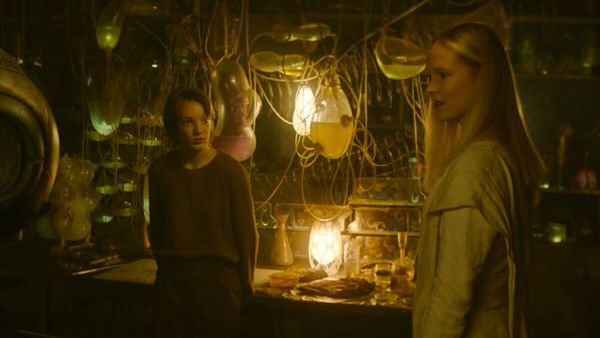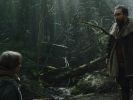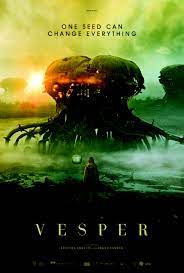Eye For Film >> Movies >> Vesper (2022) Film Review
Vesper
Reviewed by: Jennie Kermode

In order to live a thing, we first have to dream it. When it came to dreaming the future, the visionaries of 20th Century science fiction opened the doors to the space race, advances in computing and virtual reality, and and number of medical technologies, helping the public to engage with what was going on in laboratories and amongst academic thinkers, enabling it to adapt to change. But around the end of the century, science fiction went into a slump. It wasn’t that there were no more good writers – it was that the future had become far too uncertain to see clearly; or that nobody wanted to look. Popular cinema, never as concerned about the big ideas as long as it could find an audience, gave us a slew of dystopias. Every scientifically educated person knew – knows – the crisis lying ahead. What nobody could answer was this: what happens afterwards?
Part of the new breed of science fiction tales emerging to fill that gap, Vesper may have elements which feel like pure fantasy – a risk of depicting what Arthur C Clarke called sufficiently advanced technology - but it is smart, and it is serious. Its young protagonist speaks to young viewers who will grow up in a world much tougher than the one we know today – a world ravaged by climate change and sucked dry by capitalism, yet a world in which there is still room for hope.

This protagonist is Vesper, played by Raffiella Chapman, who was a standout in Homebound and just as impressive here. Vesper is a young teenager living in an isolated house in the woods with her father (Richard Brake), who is bedbound and dependent on breathing apparatus following a workplace injury. In compensation, he has received a drone, and he uses this as a telepresence device, accompanying Vesper on scavenging missions, doing what he can to keep her safe. She’s an efficient forager and knows how to avoid the various deadly plants and fungi in the area, but there are more threats around than that – not least her uncle Jonas (Eddie Marsan) and his troupe of semi-feral offspring. He makes money from these kids, extracting their blood and selling it to the people in the towering, unassailable citadel (where one assumes it is used to promote longevity, something proven to work in mice), but of course he needs women to produce them, and he has his eye on Vesper for that role.
In some ways very different from the traditional science fiction protagonist, this young, outsider heroine nevertheless has two familiar traits. She’s scientifically skilled, experimenting in synthetic biology in a lab hidden deep in the forest; and she’s determined to better her lot. She dreams of selling her skill to the citadel in exchange for a passport to the privileged life for herself and her father, but she has no means of getting in touch with people there, until fate seems to smile on her when a small vessel crashes in the middle of the woods. Rescuing a passenger who is lying in a daze nearby, she hopes to leverage the encounter to give herself a future – but the passenger has a secret, and Vesper’s world is about to change in ways she never imagined.
What most viewers will notice first about the film is its superb visual worldbuilding, which would be impressive even if it had not been achieved on a tiny budget. The small wooden house where Vesper lives has seen much better days; the forest landscape is sparse and evidences the difficulty in surviving here, but it’s also full of new life-forms which present hazards to the unwary and advantages to those who know them well. Predatory plants with snaking tendrils and stingers, producing chemicals which induce sleep or are instantly fatal, cluster beneath the trees. Some of them glow, and Vesper’s lab is full of beautiful creations with strange tropisms. She works using a vivid touch screen-style display, reminding us that this is not simply a world of loss – it also contains new technologies, like those which have reared the citadel she hopes to reach.
Credit should go to the casting team of Des Hamilton, Donatus Simukauskas and Georgia Topley, who have packed the film with bit players and extras with genetic variations – notably hypertelorism – which one would expect to occur in a thinned population. Exaggerated by make-up which is seamlessly applied and very difficult to notice otherwise, they don’t look all that unusual as individuals, but as a group they will at least unsettle viewers, even if those viewers don’t know why. The effect is more powerful because the costumes are kept simple, in line with what we have learned to expect in rural dystopias. It’s when it comes to citadel dwellers’ costumes that designers Christophe Pidre and Florence Scholtes get to play around, creating garments which really do look like they’re from another world, perfectly combining style and functionality, and signalling that these people are used to much higher standards of hygiene.
All of this detailed, diligent work goes into creating a world which is immersive and all-consuming, a world in which we find ourselves much like the crash victim, dependent on Vesper as our guide. Nothing jars or feels as if it is just there for show, and it all combines to support a story which is, ultimately, about learning to think differently, to change the way that we direct our attention and resources in order to open up the possibility of renewal. In the small house and the thick of the trees, directors Kristina Buozyte and Bruno Samper naturally keep the camera close, but notably, they continue to do so even in a context where this breaks the rules of traditional filmmaking. Only in the final scene do we see the vastness of this world, its wide expanse, its possibilities, just as Vesper undergoes her final psychological shift. As we look beyond the trees and see the woods (and more), we are invited to look beyond the bleak predictions of our own future. What lies over the horizon is once again mysterious, and who knows where the breeze will carry us?
Vesper is in UK cinemas and on digital from 21 October .
Reviewed on: 26 Sep 2022















